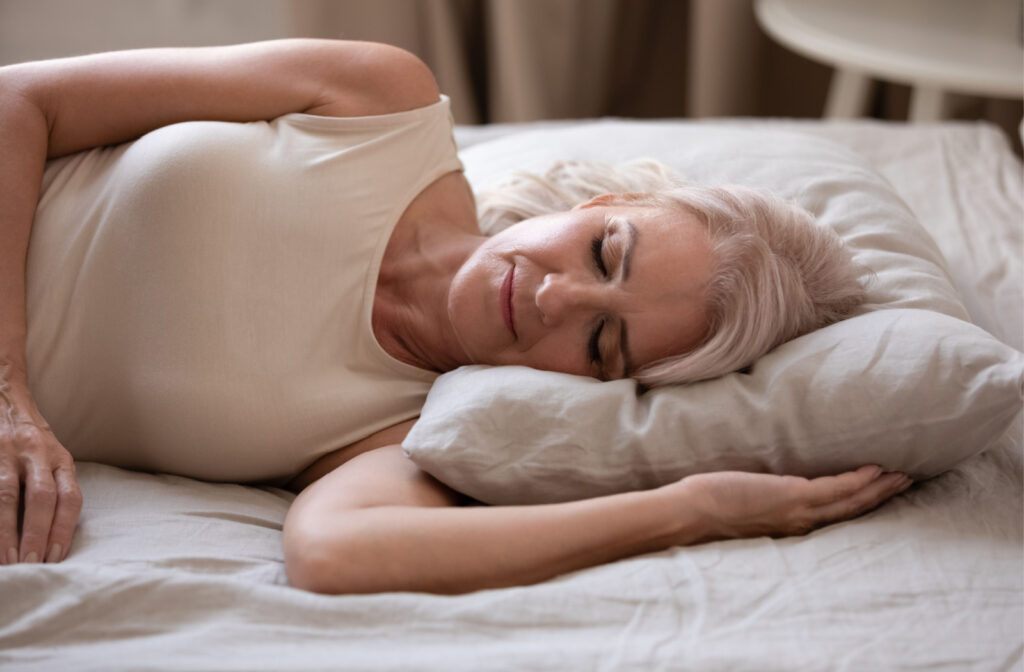As our golden years unfold, so does a fascinating aspect of life for many older adults—sleep. It’s a common observation that older adults may tend to sleep more than their younger counterparts, often prompting curiosity about the reasons behind this phenomenon.
There are several reasons why older adults may tend to spend more time in bed, and the factors that cause older adults to need more sleep include changes in their sleep cycle and circadian rhythm shifts, health considerations, sleep efficiency, psychological factors, and reduced physical activity.
Part of choosing the right level of care for seniors includes understanding physical needs like sleep. At every stage of life and in every type of senior living—from memory care to independent living—healthy sleep can be vital for maintaining overall wellness.
Changes in Sleep Patterns
One primary reason behind the increased sleep duration among many older adults lies in changes to their sleep architecture—the fundamental structure of healthy sleep.
Deep sleep and light sleep are 2 basic forms of sleep that people typically experience. As individuals age, there is a natural alteration in sleep patterns, characterized by a decrease in deep sleep (slow-wave sleep) and an increase in lighter sleep stages. This shift often leads to a perception of spending more time in bed, even if the actual restorative sleep time is reduced.
Circadian Rhythm Shifts
Another factor that contributes to older adults’ potential increased need for sleep is their circadian rhythms. As we age, our internal clocks start to shift, which means that we may naturally feel tired earlier in the evening and wake up earlier in the morning. Shifting circadian rhythms can cause older adults to get drowsy and need to go to bed earlier than younger adults, which can add up to more overall sleep time.
Older adults may also experience a phenomenon known as advanced sleep phase syndrome, where they feel sleepy earlier in the evening and wake up earlier in the morning. Advanced sleep phase syndrome can also contribute to an overall increase in sleep duration or simply time spent in bed.
Health Considerations
Health can play a pivotal role in the sleep habits of older adults. Chronic conditions such as arthritis, diabetes, or cardiovascular issues can lead to discomfort, pain, or nocturnal awakenings, prompting individuals to spend more time in bed to compensate for disrupted sleep.
Additionally, some medications commonly prescribed to older adults may have sedative effects, influencing sleep duration.
Sleep Efficiency & Fragmented Sleep
Older adults often experience a decline in sleep efficiency, meaning that a larger proportion of their time in bed is spent awake or in light sleep stages. Frequent awakenings during the night, even if brief, can contribute to the perception of needing more sleep to feel adequately rested.
Psychological Factors
Psychological factors, such as increased stress, anxiety, or depression, can impact sleep in older adults. Coping with life changes, loss of loved ones, or adjusting to retirement may contribute to an increased desire for sleep as a means of escape or emotional recovery.
Reduced Physical Activity
A decline in physical activity, a common aspect of aging, can influence sleep patterns. Regular exercise is associated with better sleep quality and a reduction in physical activity may contribute to increased daytime energy and longer periods spent in bed.
Tips for Better Sleep
Getting a good night’s sleep is often essential for maintaining your overall well-being and health, no matter your age. If you’re looking to improve your sleep, consider incorporating these tips into your routine:
- Follow a consistent sleep schedule: Going to bed and waking up at the same time every day, even on weekends, helps regulate your body’s internal clock.
- Create a relaxing bedtime routine: Develop calming pre-sleep rituals, such as reading a book, taking a warm bath, or practicing relaxation techniques like deep breathing or meditation.
- Create a healthy sleep environment: Keep your bedroom cool, dark, and quiet. Invest in comfortable bedding and a supportive mattress. Consider using blackout curtains and earplugs if necessary.
- Limit exposure to screens near bedtime: The blue light emitted by screens can interfere with melatonin production, making it harder to fall asleep. Limit screen time at least an hour before bedtime.
- Watch your diet: Avoid heavy meals, caffeine, and nicotine close to bedtime—they can disrupt sleep patterns. Opt for a light snack if you’re hungry before bed.
- Stay active during the day: Regular physical activity can promote better sleep. Aim for at least 30 minutes of moderate exercise most days, but try to finish exercising a few hours before bedtime.
- Try to manage stress: Practice stress-reducing techniques, such as mindfulness, yoga, or progressive muscle relaxation. Chronic stress can interfere with sleep, so finding healthy ways to manage stress is crucial.
- Limit naps: While short naps can be refreshing, long or irregular napping during the day can disrupt your sleep cycle. If you need to nap, keep it brief (20–30 minutes) and earlier in the day.
- Be mindful of liquid intake: Reduce your fluid intake close to bedtime to minimize trips to the bathroom during the night. However, make sure you’re staying hydrated throughout the day.
- Expose yourself to natural light: Spend time outdoors during daylight hours. Exposure to natural light helps regulate your body’s internal clock and promotes better sleep.
A Journey Toward Better Sleep
There are plenty of reasons why older adults tend to sleep more than younger adults, and most of them are related to changes in the brain and body that occur as we age. While it’s common for older adults to sleep more, it’s crucial to recognize that individual variations exist.
Understanding the reasons behind increased sleep in older adults can aid in promoting healthy sleep habits and overall well-being. If you have concerns about your sleep habits, talk to your doctor or a sleep specialist to explore different strategies for improving the quality and quantity of your sleep.
At The Villages at Murfreesboro, we are here to help assist older adults in enhancing sleep and overall health! Get in touch with us today to book a tour and learn how we support healthy, happy senior living.




